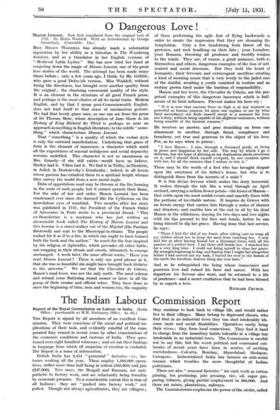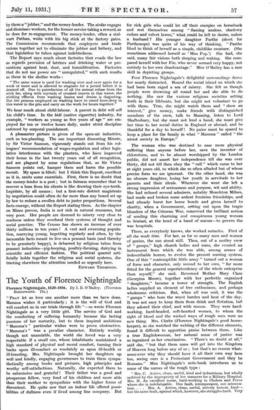The Indian Labour Commission Report
THE Report is signed by all members of an excellent Com- mission. They were conscious of the social and political im- plications of their task, and evidently mindful of the exas- perated fury roused in recent years by other examinations of the economic conditions and customs of India. They ques- tioned over eight hundred witnesses ; and set out their findings in language from which all suspicion of emotion is excluded. The Report is a mass of information.
British India has 2,451 " perennial " factories—i.e., fac- tories working all the year. These employ 1,166,000 opera- tives, rather more than half being in cotton (338,000) and jute (347,000). Two races, the Bengali and Burman, are anti- pathetic to factory work, and are reluctantly being forced in by economic pressure. To a considerable extent this is true of all Indians ; they are "pushed into factory work," not pulled. Though not always agriculturists, they are villagers; they continue to look back to village life, and would rather live in their villages. Many belong to depressed classes, who find that in an industrial town they can shed intolerably irk- some caste and social disabilities. Operatives rarely bring their wives ; they form local connexions. They find it hard to change from the insanitary habits tolerable in a village but intolerable in an industrial town. The Commission is careful not to say this, but the worst political and communal out- breaks of recent years have been in centres of seething wretchedness—Calcutta, Bombay, Ahmedabad, Sholapur, Cawnpore. Industrialized India has become an anti-social menace which troubles the more thoughtful of Indian politicians.
There are also "seasonal factories" for such work as cotton ginning, tea producing, jute pressing, rice, oil, sugar pre- paring, tobacco, giving partial. employment to 386,000. And there are mines, plantations, railways.
The Commissioners emphasize the power of the sirdar, called by them a "jobber," and the money-lender. The sirdar engages and dismisses workers, for the former service taking a reward, as he does for re-engagement. The money-lender, often a stal- wart Pathan, waits with his big stick at the factory gates. The Commission recommends that employers and trade unions together act to eliminate the jobber and bribery, and that legislation be taken against indebtedness.
The Report says much about factories that evade the law as regards provgion of latrines and drinking water or pre- cautions against heat, dust, and humidification. Factories that do not use power are "unregulated," with such results as these in the shellac works :
"The same water is used for washing over and over again for a week or more and is allowed to stagnate for a period before it is drained off. Due to putrefaction of all the animal refuse from the stick lac, along with myriads of crushed insects in this water, the stinking effluvia from washing basins and drains is disgusting. But the persons employed on washing have to stand knee-deep in this water in the pits and carry on the work for hours together."
We hear much about child-labour. A parent in debt will sell his child's time. In the bidi (native cigarette) industry, for example, "workers as young as five years of age" are em- ployed for ten or twelve hours daily, under strict discipline enforced by corporal punishment.
A pleasanter picture is given of the open-air industries, such as tea-planting. The one important dissenting Minute, by Sir Victor Sassoon, vigorously stands out from his col- leagues' recommendation of wages-regulation and other legis- lative interference with the planters, who have improved their house in the last twenty years out of all recognition, and are plagued by some regulations that, as Sir Victor Sassoon points out, hamper them and harm the possible recruit. My space is filled; but I think this Report, excellent as it is, omits some essentials. First, there is no doubt that the money-lender is a pest ; but in fairness remember that to recover a loan from his clients is like drawing their eye-teeth. Legislate, by all means ; but a first-rate district magistrate by negotiation could often do far more than any board set up by law to reduce a swollen debt to juster proportions. Several facts emerge, without the Report stating them. As the chapter on Mines proves, India is not rich in natural resources, but very poor. Her people are doomed to misery very close to madness unless they overhaul their systems of thought and social practice. The Census has shown an increase of over
thirty millions in ten years ! A vast and swarming popula- tion, marrying young, begetting regularly and often, by the inexorable facts meant to live on a peasant basis (and thereby to be genuinely happy), is debarred by religious tabus from peasant industries—pig-keeping, poultry-farming, dairying in scientific and efficient fashion. The political quarrel arti- ficially holds together the religious and social systems, dis- tracting elsewhere the attention needed so urgently here.
EDWARD THOMPSON.



































 Previous page
Previous page